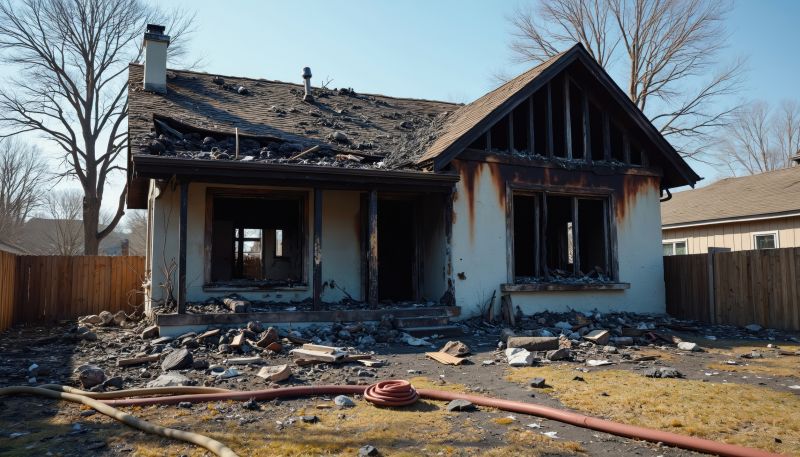Leading Fire Restoration Materials To Support Complete Property Recovery
Utilize high-quality products crafted to aid in thorough fire damage cleanup and restore structural integrity.
 Fire restoration involves a comprehensive approach to repairing and restoring properties affected by fire damage. It encompasses a range of tasks including soot and smoke removal, odor elimination, structural repairs, and ensuring the safety and integrity of the building. Proper restoration requires specialized products designed to address the unique challenges posed by fire damage, such as corrosive residues and lingering odors. Utilizing the right tools and materials can significantly improve the efficiency and effectiveness of the restoration process.
Fire restoration involves a comprehensive approach to repairing and restoring properties affected by fire damage. It encompasses a range of tasks including soot and smoke removal, odor elimination, structural repairs, and ensuring the safety and integrity of the building. Proper restoration requires specialized products designed to address the unique challenges posed by fire damage, such as corrosive residues and lingering odors. Utilizing the right tools and materials can significantly improve the efficiency and effectiveness of the restoration process.
Top Overall Option
Multi-Purpose Fire Damage Restoration Kit
A versatile, comprehensive kit designed to address soot removal, odor neutralization, and surface cleaning. Includes cleaning agents, deodorizing solutions, protective gear, and application tools suitable for various surfaces. Ideal for both professional restorers and DIY efforts, it provides a balanced combination of effectiveness and ease of use.
Types of Products For Fire Restorations
Soot and Smoke Cleaners
Specialized solutions formulated to safely break down soot and smoke residues on different surfaces.
Odor Neutralizers
Products designed to eliminate persistent fire odors from fabrics, carpets, and hard surfaces.
Surface Degreasers
Heavy-duty cleaners for removing greasy residues left by smoke and fire damage.
Protective Gear
Respirators, gloves, and coveralls to ensure safety during restoration work.
Air Filtration Devices
HEPA filters and air scrubbers to improve indoor air quality during cleanup.
Structural Repair Materials
Patching compounds, sealants, and adhesives for restoring damaged walls, ceilings, and floors.
Dehumidifiers and Drying Equipment
Tools to reduce moisture and prevent mold growth in affected areas.
Electrostatic Sprayers
Devices for even application of cleaning and deodorizing solutions.
Fire Damage Assessment Tools
Infrared cameras and moisture meters to evaluate the extent of damage.
Cleaning Cloths and Sponges
Absorbent and durable materials for manual cleaning tasks.
Sealants and Primers
Preparatory products for surfaces before repainting or finishing.
Deodorizing Foggers
Devices that disperse deodorizing agents throughout a space for comprehensive odor removal.
Chemical Absorbents
Materials that absorb and contain chemical residues from fire suppression efforts.
Fire-Resistant Paints
Coatings that can help prevent future fire spread on restored surfaces.
Electrical Safety Tools
Insulated tools and testers for safe handling of electrical components during repairs.
Popular Choices
Widely used for quick deodorization of affected rooms and fabrics.
Commonly selected for heavy-duty soot removal on walls and ceilings.
Popular for improving air quality during and after restoration.
Essential protective gear favored by professionals for safety and hygiene.
Effective for long-term odor control in storage or less accessible areas.
Convenient tools for dusting and cleaning surfaces with charged particles.
Commonly used to secure surfaces before repainting or sealing.
Popular for quick moisture removal in damaged spaces.
Trusted by professionals for evaluating extent of damage accurately.
Frequently chosen for manual soot and grime removal.
Preferred for comprehensive scent neutralization in large areas.
Used to contain and clean chemical residues from firefighting efforts.
Selected for surface finishing after restoration to enhance safety.
Commonly used for assessing drying progress and preventing mold.
Popular among restoration workers for safety and contamination control.
Restoring a property after fire damage often involves cleaning and deodorizing surfaces, which can be complicated by the variety of materials involved, from wood and drywall to furniture and textiles. Fire restoration products are formulated to penetrate surfaces, neutralize odors, and remove soot without causing further damage. Additionally, protective gear and air filtration devices are essential to safeguard workers from harmful residues and airborne particles.
Choosing appropriate products for fire restoration depends on the extent of damage, the types of surfaces involved, and the specific odors present. It is crucial to select high-quality, effective products that facilitate thorough cleaning, deodorization, and structural repairs. Proper use of these products can help restore properties to a safe and livable condition, minimizing long-term damage and costs. Whether dealing with minor smoke stains or extensive fire damage, having the right supplies on hand is vital for a successful restoration effort.
Key Buying Considerations
- Type and extent of fire damage to determine appropriate products.
- Surface materials involved, such as drywall, wood, or textiles.
- Effectiveness of odor neutralization for persistent smells.
- Compatibility of cleaning products with various surfaces.
- Safety features and protective gear included with the products.
- Ease of application and whether specialized equipment is needed.
- Drying and curing times to ensure thorough restoration.
- Portability and storage considerations for larger kits.
- Brand reputation and product reviews from industry professionals.
- Cost-effectiveness relative to the scope of restoration work.
- Environmental conditions of the affected area, such as humidity levels.
- Availability of technical support or instructions for use.
- Compliance with safety standards and certifications.
- Compatibility with existing cleaning or restoration equipment.
- Long-term durability and resistance of repair materials.
This content contains affiliate links. We may earn a commission if you make a purchase through these links, at no additional cost to you.
